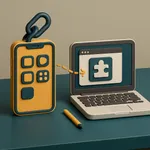Rethinking C++
in an Era of Go, Rust, and Zig
The software engineering conversation today is dominated by languages like Go, Rust, and Zig. Having worked extensively with them, I’ve often found them to be more 'different' than fundamentally innovative compared to my established tools. This led me to a surprising question: what if the real evolution wasn't in a new language, but in the modernization of an old one? My journey back to C++—a language I had long dismissed—revealed a ecosystem transformed by smart tooling, powerful paradigms like data-oriented design, and a philosophy that now feels strikingly aligned with clarity and performance. This is not the C++ I remembered.
Why PWAs Still Lag
Behind Native Apps in 2026
It’s 2026, and the promise of Progressive Web Apps feels both tantalizingly close and frustratingly distant. While you can 'install' a web app like YouTube and access right-click menus from your taskbar, the mobile landscape—particularly on iOS—remains firmly in the grip of native applications. Apple’s restrictions on background tasks and push notifications act as powerful reinforcements for the app store status quo. Yet, for indie developers, the allure is undeniable: no gatekeepers, no fees, and instant updates. So why does the native app still reign supreme, and is there a viable middle ground for projects that need more than the browser sandbox allows? This article digs into the technical and commercial realities holding PWAs back and outlines a progressive strategy to extend their reach.
The Two Faces of Abstraction:
Power vs. Hidden Dependency
Every line of code we write, every system we design, rests on a towering stack of abstractions. It’s the fundamental law of computing: we build simpler interfaces to harness overwhelming complexity. But I’ve come to see that not all abstractions are created equal. Some are liberating tools that let us focus on solving higher-order problems. Others, however, are seductive traps that bundle complexity into a black box, creating hidden dependencies and obscuring the very systems we rely on. In this article, I want to unpack the distinction between these 'genuine' and 'camouflaged' abstractions. By examining examples from operating systems to modern web frameworks, we can learn to identify which layers truly empower us and which ones we should approach with caution and a deeper understanding.
Why Web Technologies Still Win
for Cross-Platform GUI Development
The user interface is the most critical point of contact between human and machine. It’s the layer where pure functionality transforms into a subjective experience of 'good' or 'bad,' and it can even mask underlying technical shortcomings. My journey through the landscape of cross-platform development has reinforced a central belief: while native applications offer an ideal user experience, the modern demand for universal accessibility makes a web-based core indispensable. This article delves into the current ecosystem—from Flutter and React Native to Kotlin Multiplatform—and explains why, for me, technologies like PWAs and frameworks such as Tauri or Wails represent the most pragmatic and future-proof path forward for building graphical user interfaces.
Container-Driven Development:
Beyond Production, Into Your Workflow
If you think containers are just for CI/CD and production, you're missing half the story. The same isolation that makes deployments reliable can transform your local development environment from a fragile house of cards into a robust, reproducible workshop. In this article, I detail how I leverage containers not just to run software, but to build, test, and debug entire systems locally. I’ll walk through the concrete advantages—from managing conflicting dependencies and creating production-like microcosms to extracting deeper insights from test coverage. Finally, I’ll explain my conscious choice of Docker Compose over higher-level abstractions like Testcontainers, arguing that sometimes the most powerful workflow is built on foundational tools used deliberately.




